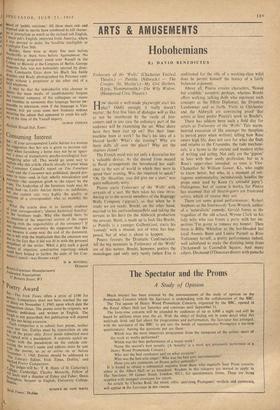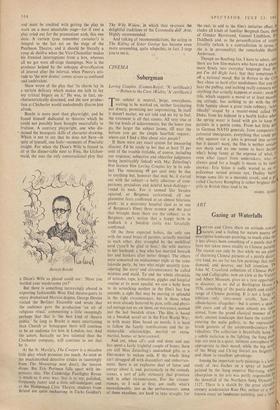ARTS & AMUSEMENTS
Hobohemians
By DAVID BENEDICTUS Trelawney of the 'Wells.' (Chichester Festival Theatre.) — Puntila. (Aldwych.) — The Creeper. (St. Martin's.)--My Girl Herbert. (Lyric, Hammersmith.)—The Wily Widow. (Hampstead Civic Theatre.)
How should a well-made playwright start his nlay? Oddly enough, it really doesn't matter; the first few lines of dialogue will as like as not be smothered by the rustle of late- corners and in any case the sedentary part of the audience will be examining the set. What shore have they been cast up on? Has their time- machine been at work? So that's his idea of a blasted heath! What's she ironing? Why are there dolls all over the place? Why are the shutters closed?
The French maid was not only a decorative but a valuable device. As she dusted from mantel to floral arrangement she introduced her audi- ence to the sort of world in which they were to spend their evening. Was she required to speak? `Oh, Dr. Heseltine. you did give me a start,' was quite sufficiently witty.
Pinero starts Trelawney of the 'Wells' with servants of a sort. He then takes his time intro- ducing us to the several members of the Bagnigge Wells Company ('gipsies'), so that when he is ready we are ready. Brecht, on the other hand, married to his entfremdungseflekt and taking the servant as his hero (in the Aldwych production the servant, Matti, is made up to look like Brecht, as Puntila is a younger Gulbenkian), starts his 'comedy' with a résumé, not of what has hap- pened, but of what is about to happen.
Pinero favours the Dramatic Confrontation. All the big moments in Trelawney of the 'Wells' are of this nature. Brecht, however, prefers the monologue and only very rarely (when Eva is auditioned for the rule of a working-class wife) does he permit himself the luxury of a fairly balanced argument.
Above all, Pinero creates characters, 'flawed but credible,' eccentric perhaps, whereas Brecht offers walking, talking dolls who represent such concepts as the Effete Diplomat, the Drunken Landowner and so forth. Visits to Chichester and the Aldwych are convincing proof that actors at least prefer Pinero's work to Brecht's.
There has seldom been such a field day for actors as Trelawney of the 'Wells.' This warm- hearted evocation of life amongst the thespians (a period piece when written), telling how Rose enters high life, does not care for what she finds and returns to the Crummles, the rude mechani- cals, is a hymn to the ancient and modern styles of writing and acting. Not only are the `gipsies' in love with their seedy profession, but so is Rose's upper-class intended; so even is Vice- Chancellor Sir William Gower. Kt., who ought to know better, but who, in a moment of out- rageous sentimentality, incredulously handles the props once used by Kean ('a splendid gipsy'). Outrageous, but of course it works, for Pinero has assumed that all theatre-goers are frustrated actors, which of course they are.
There are some grand performances: Robert Stephens as the Isherwoody Tom Wrench, author of a 'naturalistic' comedy. Gerald James as the tragedian of the old school. Wynne Clark as his lady wife who can freeze a party with her im- perious 'I'm going to remove my bonnet.' Then there is Billie Whitelaw as the hot-blooded but loyal Avonia Bunn and Louise Purnell as Rose Trelawney herself, a pretty performance indeed, well calculated to make the dizzying jump from Clerkenwell to Cavendish Square. And many others. Desmond O'Donovan directs with panache
and must be credited with getting the play to work on a most unsuitable stage—for if ever a play cried out for the proscenium arch, this one does. A curtain (you remember curtains!) is integral to the last act on the stage of the Pantheon Theatre, and it should be literally a coup de theatre when the Vice-Chancellor makes his frenzied interruptions from a box, whereas all we got were off-stage thumpings. Nor is the producer helped by the unhappy diversification of interest after the interval, when Pinero's atti- tude to 'the new dratna' comes across as confused and ambivalent.
Shaw wrote of the play that 'its charm lay in a certain delicacy which makes me loth to lay my critical fingers on it.' He was, in fact, un- characteristically disarmed, and the new produc- tion at Chichester would undoubtedly disarm him afresh.
Brecht is more poet than playwright; and he found himself dedicated to theories. which he could not possibly have brought successfully to fruition. A contrary playwright, one who dis-
• dained the bourgeois skills of character drawing. Which is not to say that he does not have—in spite of himself, one feels—moments of Pinerotic insight. For when the Dean's Wife is forced to sit at the dinner-table next to Fina, the kitchen- maid, she uses the only conversational ploy that BertoIt Brecht a Dean's Wife so placed could use: 'Have you bottled your mushrooms yet?'
But there is something increasingly absurd in expecting fashionable West End theatre-goers to enjoy dramatised Marxist dogma. George Devine visited the Berliner Ensemble and wrote that the audience gave the production 'an air of religious ritual,' commenting a little sweepingly perhaps that that is 'the best kind of theatre public.' So long as Brecht is more entertaining than Church or Synagogue there will continue to be an audience for him in London, too. And the actors, basically no less talented than the Chichester company, will continue to see that he is.
At the St. Martin's, The Creeper is a macabre little play which promises too much. As soon as the mackintoshed detective strides in (seemingly from The Mousetrap next door), the tension drops. But Eric Portman falls apart with im- pressive chic. The Cambridge Footlights Revue is much: as it ever was; that is to say, polished, frequently funny and a little self-indulgent; and at the Hampstead Civic Theatre, students from Bristol are quite enchanting in Carlo Goldini's The Wily Widow, in which they re-create the delightful traditions of the Commedia dell' Arte. Highly recommended.
And talking of recommendations, the acting in The Killing of Sister George has become even more astounding, quite telepathic, in fact. I urge you to see it.















































 Previous page
Previous page